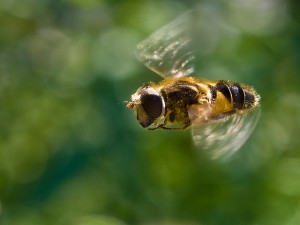Low levels of glyphosate affect honeybees
A study published in Experimental Journal of Biology suggests that exposure to low levels of the herbicide glyphosate—the active ingredient in Roundup™—may negatively affect honeybees. Researchers fed honeybees sugar water with one of three low concentrations of glyphosate, all considered to be below the lethal level, and then tracked their flight path home through an open field. They found that the bees fed the highest of the three sub-lethal doses flew back to their hives slower and took more indirect routes than bees fed the lower doses. Bees were then released a second time. After the second release, control bees had learned the route home and returned to the hive directly whereas bees fed glyphosate continued to take indirect routes. The authors conclude, “These results suggest that, in honeybees, exposure to glyphosate doses commonly found in agricultural settings impairs the cognitive capacities needed to retrieve and integrate spatial information for a successful return to the hive. Therefore, honeybee navigation is affected by ingesting traces of the most widely used herbicide worldwide, with potential long-term negative consequences for colony-foraging success.”


